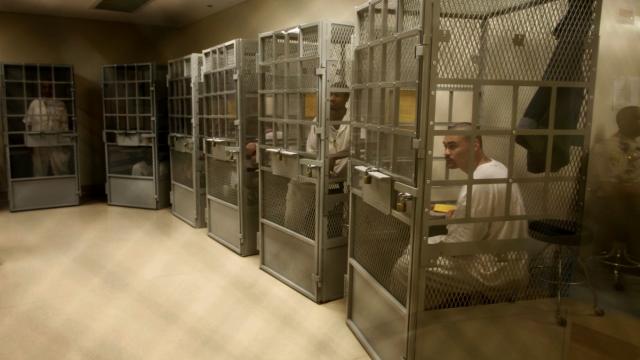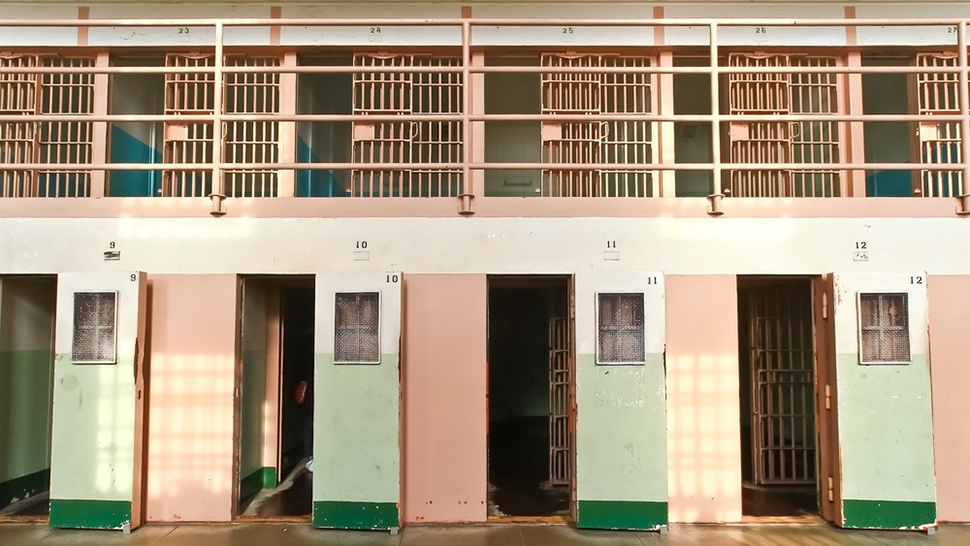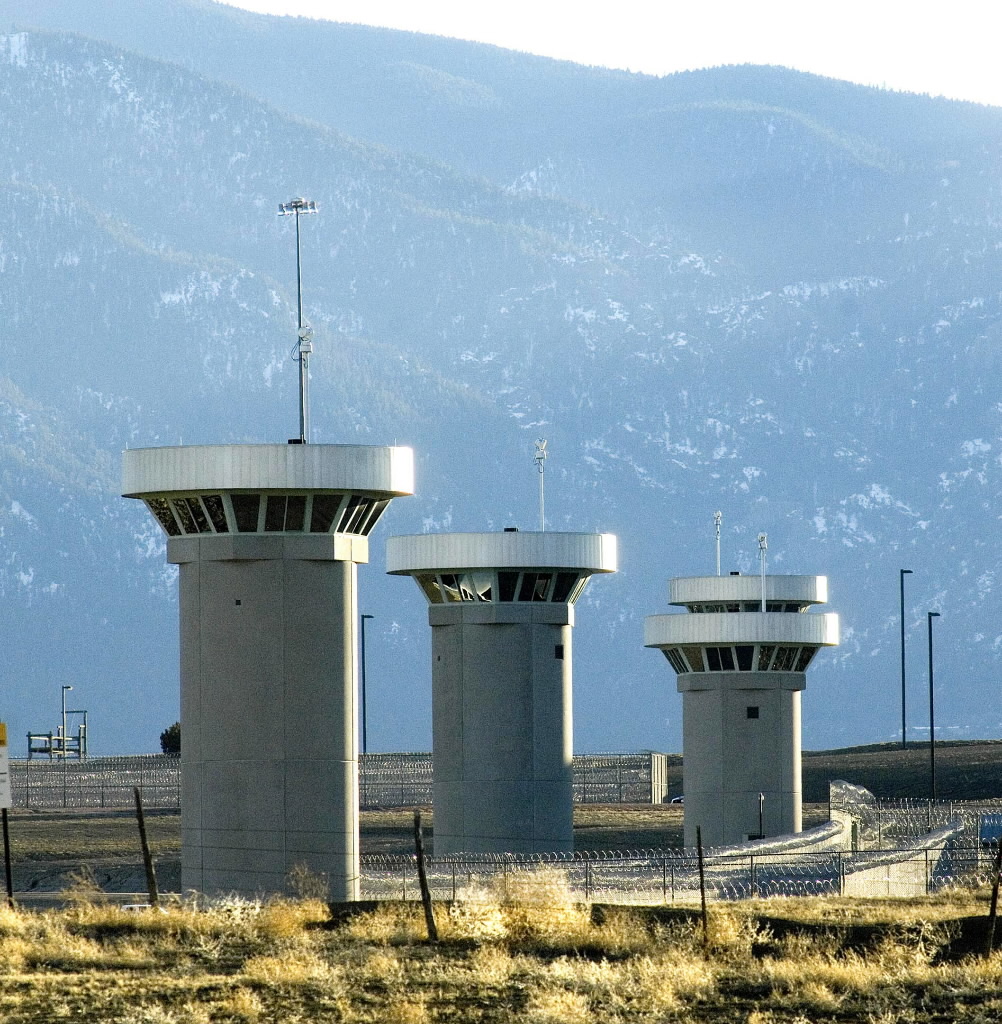
Big Frankie, Little Frankie and Al, three black men who spent a lot of time in prison and have put their lives back together in the face of joblessness, crushing poverty and the violence of city streets, abruptly stopped appearing at the prison support group I help run at the Second Presbyterian Church in Elizabeth, N.J. This happens in poor neighborhoods. You see people. You make plans to see them again. And then without explanation they vanish. They get arrested for something, often trivial, after the police randomly stop them, run a check and find they owe fines, missed a court date or a meeting with a probation officer, owe child support, violated probation or have a couple of ounces of pot. The big mechanical jaw of the legal system gulps them down. And since they are poor and cannot afford bail they stay locked up. And that appears to be what happened to Big Frankie, Little Frankie and Al.
The rumor on the street is that Little Frankie, whose name is Frank Clarke and who is of Hispanic descent, did not appear for a court date because he was afraid of being deported. But no one is sure, except about the being afraid part. The Union County Jail in Elizabeth says Big Frankie and Al were arrested for “possession of controlled dangerous substances.” But this does not mean they had drugs. They might have. But they might not have. Police plant drugs all the time. And if Big Frankie and Al did have drugs they did not have very much.
In America, when you are poor, you can instantly disappear like this into the subterranean rabbit holes of our vast jail and prison complex. You crawl out weeks, months or years later. You try to pick up where you left off. You avoid the cops. You look for work. There is no work. It is a constant cat-and-mouse game the state plays with the poor. The hunters. The hunted. The poor, no matter what they do, are always potential prey, minnows in a sea of sharks. It is not only the masses in the Middle East and the jihadists who despise us for our purported “values.” The vast, persecuted underclass, the human refuse callously cast aside by our corporate state, the legions of poor our bankrupt media have rendered invisible, the young, violent street toughs with no education, no jobs, no prospects also see through the empty rhetoric of the power elite when it speaks about our freedoms and democracy.
The arrest of Big Frankie—his legal name is James Gibbs—has rippled through poor sections of Elizabeth with a peculiar pain. Everyone knows what the state does not: Big Frankie, who is in his 40s, is a good man. He is one of the pillars of the drop-in section for the poor and the homeless at St. Joseph Social Service Center, down the street from Second Presbyterian. He normally goes there nearly every day to sort donated clothes. He leads the prayer group. He serves food, and because of his imposing bulk he provides security. He is revered, however, not for his strength and size but his compassion, because he is patient and gentle.
When Big Frankie, who has a history of using illegal drugs, first went to prison he thought he was going for a year. But he says that because he “didn’t read and write too well” he signed a police confession and consequently was sentenced to 10 years in prison in Leesburg, N.J. He found Jesus while he was incarcerated. He got out in 2001. “The best thing in my life was finding Jesus,” he told me. “That’s who really saved me. And you know I wake up every morning and I pray. I do my best.”
“But you know what I found out when I got in there [prison] is that I lived good,” Big Frankie told me when we were having coffee a few days ago before his latest arrest. “I lived just as good in prison as I lived on the street. And that’s because I made it that way, not because they made it that way. But I know one thing: I’m not going to go back to find out if I’m going to like it again. And that’s what really makes it upsetting because a lot of people really don’t want to give people a chance because people tend to go one way, when they should go this way. You know, I decided when I was there that this was the last time I’m coming back. And one of the officers said, ‘Yeah, they all say that.’ I haven’t been back. ’Cause I know I don’t want to live like that no more.”
“I sold drugs all my life,” he said. “It just took me a long time to get caught. But, I don’t want to live like that, you know what I’m sayin’? And we sit and we talk, and we talk, and we talk, but nobody is really doing nothin’ about it. No one is really telling these young people that ‘We did this. You don’t have to do it.’ ... A lot of them don’t want to listen to it.”
“I don’t know if you know, but Generation X is very serious,” said a man who was there with us that morning and who goes by the name of Moses. “I’m 63. I’m older than all these guys. I’m 63. I’m blessed that my seven children, that between my mother and myself, they made it. They got their own homes, their own cars, the family, the whole nine yards, the whole story. They got it like that. But there’s a Generation X out there. No one left them anything. No one gave them any education or knowledge about anything. They’re doing it on the cuff. This is where they live.” He points to his arm. “Right here.”
“Living off the cuff means they are reactors,” Moses said. “And they are very serious. It needs to be takin’ focus. It really seriously needs to be looked at. Something needs to be done. It needs to be done in a hurry, because they’re getting ready to react. They’ll take lives. They already doin’ it. They already doin’ it. It’s plain. It’s simple. It’s wide open. But I’m trying to figure out why nobody is takin’ focus on this. And we keep talkin’ about the black-on-black—no, it ain’t the black-on-black crimes. You’ve got just as many whites, and Italians, and Spanish, and black. You’ve got all people out there, man. Matter of fact, when I watched the election, the re-election of Obama, let me tell you what I observed. Now I ain’t nobody. I saw a lot of young white students that rebelled against the old order of how [Americans] should think as whites.”
“The way I was brung up, I was brung up strict,” Big Frankie said. “My mother brung me up with an iron fist. I still went this way. So, a lot of times, you could bring your child up strict—‘You can’t go outside; you can’t do this’—but whatever they want to do, they’re going to do it when they get on their own. So it’s not always—I’m not disagreeing with you, my brother, but it’s not always that. A lot of times kids choose to go the wrong way. ’Cause I chose to go the wrong way. It was an easier life. It was easier to get out there and sell drugs. It was easier to rob people, you know what I’m saying?”
“We used to fight, and tomorrow we be friends,” Moses said. “My mother wasn’t going to a funeral [every week]. Your mother wasn’t going to a funeral. Today I’m scared to death. Let me tell you something. I’m old school. I’m scared. I’ll be in the house at 7 o’clock. When I come from work, from the church, I go in the house. ’Cause them young boys ain’t got no problem with puttin’ something hot in you.”
“You ever seen an associate of yours laying on the ground with his head open, wide open?” Al, whose full name is Albert Gordon, asked that morning. “Just picture his brain matter on you. Me and my friend, standing this close. I had my son with me; he was like 13 at the time. We was conversating, talking. Seen a truck come around. Wherever I’m at, I always observe my surroundings. Car going around, he go around twice. I say, ‘Yo, did y’all peep that car out?’ ‘Nah, you being paranoid.’ I said, ‘Something ain’t right.’ So as I’m getting ready to tell him I’m leaving, I pull my son this way, the car come around, I say, ‘Yo, get down.’ I grabbed my son. All I heard was boom, and I felt something wet. And, I called my son name and he said, ‘Dad, I’m all right.’ I look over and my friend is laying there, his head wide open. I got his brain matter all on my face, all on me and shit. Pardon my French. Get us on the bus, coming home police pull the bus over. Had to go back. They questioned me what happened. I said, ‘I don’t know, me and my son stopped. I was talking to a friend of mine. We started walking, heard a gun go off.’ Like I said, in my area [in the old days], we fought with hands, next day we talk, we cool. Now, they shoot and they kill you. They going kill you. If you pull a weapon out, you pull it out to shoot and kill, not to show and tell. It’s just—that image [of the murdered man] stayed in my mind and sometimes when I’m talking now I can see it. It’s crazy. It’s really crazy.”
“I done been shot before,” Big Frankie said. He lifted his shirt to show the scar from a gunshot wound in his chest. “And even when the guy had the gun on me, I didn’t care, you know. It’s like I know you, you’re not robbing me, and he still shot me.”
“A lot of people don’t believe that I have changed,” said Al, who like his cousin Big Frankie has a past marked by drug abuse. “I knew who had money. I would walk right up on you, ‘Could you tell me what time it is?’ When you go to look down. …” Al slammed his fist into his palm.
“If he can change, anybody can change,” Big Frankie said of Al.
“I hated myself,” Al said. “I took all the mirrors down in my house because I didn’t want to look at me. I hated myself. I was one of the worst characters you would want to be around. And I would just sit there and I’d scope. And I would start stuff. Just out of the blue. I didn’t like myself. Now I can walk with my head held high. And you know at one time people would give me respect because they feared me. The way I used to be. They give me respect now because they know I’m a changed man.”
But there are things Big Frankie, Little Frankie and Al cannot change. They cannot change being black and poor. They cannot change their prison records. They cannot change their powerlessness in the face of oppression. They cannot change the cruelty of corporate capitalism or the racism of the police, who Al says threw him to the ground, kicked him repeatedly in the head and called him a “nigger” as he was being arrested the last time. They cannot change the fact that they were denied an education and are denied work at which they can make a living wage. They cannot change the system. And to the system, Big Frankie, Little Frankie and Al remain what they have always been—the condemned.
3 WAYS TO SHOW YOUR SUPPORT
- Log in to post comments
















